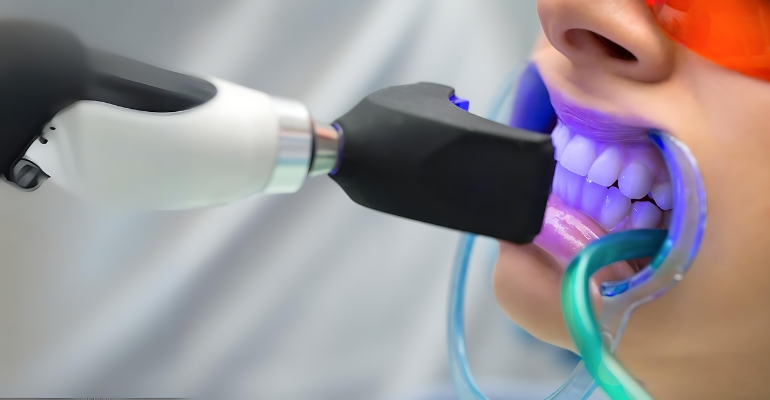
Can Laser Dentistry Be Used for Root Canals?
A root canal procedure functions as one of the standard treatments for treating infected or damaged tooth pulp. Traditionally medical staff use drills and mechanical instruments to extract infected tissue while cleaning the targeted area. Technology developments in dentistry enable laser dentistry to serve as a better and less aggressive treatment procedure. Healed teeth result through the combination of light energy beams which eliminate infections while cleansing the canals and supporting tooth sealing thus providing both fast recovery and decreased discomfort. The use of lasers remains available as a treatment option for root canals. Using laser technology leads to root canal improvements through reduced pain and enhanced precision and speeds up healing processes which creates a better experience for patients.
What Is Laser Dentistry for Root Canals?
A modern method of treating root canals employs light-focused beams to execute key procedure steps while producing high precision along with limited discomfort. In the past root canal procedures mainly utilized drill tools as well as endodontic files together with traditional mechanical instruments for infected pulp tissue extraction along with root canal cleaning and final sealing preparations. The inclusion of laser energy in root canal treatments allows this procedure to operate with more efficiency as well as provide additional comfort and reduced invasiveness to patients.
The utilization of diode and erbium laser devices stands as the choice for most dentists depending on the treatment stage and tissue type in laser root canal procedures. A small laser-made opening starts the process as it provides access to the infected dental pulp. Inside the cavity the laser exactly vaporizes damaged tissue material to protect healthy tooth structures. The laser operates to excite irrigation solutions enabling penetration into narrow areas of the root system.
Laser sterilization stands as one of the most important applications when lasers are used for root canal therapy. With its thermal energy the laser executes bacterial elimination thus minimizing the risk of reinfection and improving the success potential of treatment. The therapeutic benefits of laser energy involve shrinking inflammation in adjacent tissues while improving speed of recovery and easing postoperative pain. Lasers perform tissue regenerational functions which help patients recover better.
Through laser dentistry patients benefit from reduced bleeding tension and minimal anesthesia requirement together with less swelling and a quieter treatment environment that specifically helps patients manage their dental anxiety. Laser technology acts as a substantial enhancement for root canal procedures but operates together with established methods instead of functioning independently. Because complex root canal systems need complete cleaning and shaping the mechanical tools must also be utilized.
Endodontics has experienced a substantial advancement through laser dentistry because it delivers cost-effective yet precise treatment while ensuring patient safety in root canal therapy procedures. The advancement of technology together with its broader availability sets the stage for laser-assisted methods to increase their influence on contemporary dental healthcare.
How Does Laser Dentistry Work for Root Canals?
The root canal treatment using laser dentistry includes multiple procedural steps that produce higher accuracy and enhanced performance together with decreased pain sensation for patients. These are:
- Accessing the Root Canal: Through the first step the dentist will operate a laser instrument to create a tiny exact opening in the targeted tooth. The opening procedure damages only minimal tooth enamel together with dentin thus creating a gentle entrance to the therapy.
- Removal of Infected Tissue: After accessing the root canal the laser performs a light beam operation that destroys the infected tissue together with bacteria and debris. A specific lens delivery system lets clinicians aim adequately for precise tissue removal of infected areas while maintaining the integrity of healthy tissue and ensuring complete treatment of the infection.
- Cleaning and Shaping the Canal: Strong laser energy removes the combination of debris and biofilm which resides in complex root canal areas that standard tools cannot access. The laser system allows efficient shaping of the canal by using minimal physical contact which in turn decreases discomfort alongside possible harm.
- Sterilization: The laser's heat energy destroys bacteria and microorganisms throughout dentinal walls because it creates deep penetration. Treatment success is improved when sterilization reaches this advanced level which minimizes chances of reinfection.
- Promoting Healing: The laser therapy works by stimulating neighboring tissues which enhances blood circulation alongside reducing inflammation that speeds up the healing process. The post-operative pain and recovery time decrease as patients benefit from treatment with lasers.
This laser technology not only makes the root canal procedure quicker but also reduces discomfort, improves recovery times, and helps preserve more of the natural tooth structure.
Benefits of Root Canal Treatment with Laser Dentistry
| Benefit | Traditional Root Canal | Laser Root Canal |
|---|---|---|
| Pain | Moderate to severe discomfort | Less pain, often no anesthesia needed |
| Recovery Time | Longer recovery with swelling and discomfort | Faster recovery with minimal swelling |
| Risk of Infection | Higher risk due to mechanical cutting | Reduced risk as lasers sterilize during treatment |
| Precision | Less precision, can affect healthy tissue | Greater precision, preserves healthy tissue |
| Treatment Duration | Longer treatment time | Faster treatment due to efficient cleaning |
Is Laser Dentistry Right for Root Canals?
Laser dentistry provides numerous positive aspects for performing root canal procedures but remains ineffective against specific types of patients or dental conditions. The use of laser technology in root canal procedures depends on how severe the infection is combined with the amount of tooth damage and root canal system characteristics.
When contamination extends between tissue areas traditional cleaning methods should be used to guarantee complete sterilization and adequate cleaning. The integrity of a severely damaged tooth may benefit better from traditional restoration methods instead of laser procedures. Complexities within the root canal frameworks of teeth sometimes call for mechanical instruments during exact treatment procedures.
Your dentist will evaluate various conditions to determine if laser dentistry for root canals should be your treatment method because it represents the most efficient and comfortable approach for sustaining dental health.
Why Choose Laser Dentistry for Root Canal Treatment?
- Pain Reduction: Laser root canal treatments are significantly less painful than traditional methods. The focused laser energy gently removes infected tissue with minimal pressure or vibration, reducing the need for local anesthesia. The absence of the high-pitched sound of a dental drill also helps alleviate fear, making the experience less stressful—especially for patients with dental anxiety.
- Faster Healing and Recovery: Laser procedures are minimally invasive, causing less trauma to surrounding tissues. This leads to reduced swelling, bleeding, and post-operative discomfort. The laser also promotes faster tissue regeneration, allowing patients to return to normal activities more quickly than with conventional treatments.
- Greater Precision and Efficiency: Lasers provide pinpoint accuracy in targeting only infected or damaged tissue. This reduces the risk of unnecessary removal of healthy tooth structure and improves the preservation of the natural tooth. The procedure can also be completed more efficiently, potentially shortening treatment time.
- Enhanced Sterilization and Lower Risk of Infection: One of the major benefits of laser dentistry is its ability to thoroughly disinfect the root canal system. The laser's heat eliminates bacteria deep within the canals, even in areas difficult to reach with traditional instruments. This reduces the risk of post-treatment infection and improves the long-term success rate of the procedure.
- Minimally Invasive Approach: Because lasers often require smaller incisions or access points, there is less disruption to surrounding tissues. This makes the procedure less invasive, leading to a more comfortable experience during and after treatment.
- Reduced Bleeding and Inflammation: Laser energy helps cauterize blood vessels during treatment, which means patients experience significantly less bleeding and swelling. This contributes to a cleaner surgical field and smoother recovery process.
- Improved Patient Comfort and Experience: With no vibration, minimal noise, and fewer physical tools used, patients often find laser root canals far more tolerable than traditional ones. This improved experience can make patients more willing to complete their dental treatments.
- Effective in Complex Cases: Laser dentistry can be especially beneficial in cases where root canal anatomy is complex or where traditional tools may struggle to reach certain areas. The ability of lasers to access narrow and curved canals increases the chances of complete decontamination.
Conclusion
Laser dentistry is a faster, more precise, and comfortable option for root canals. It's less painful, heals faster and has better outcomes. At Radiant Smiles Dental Clinic we use Biolase laser technology for a comfortable, minimally invasive experience. We have our own OPG X rays, our own 3D scanner for proper planning, and we are able to do same-day restorations using a 3D printer. Once you come into our clinic and relax in our comfortable lounge, you can count on our personalized care to help you through your experience in our spacious 3 chair clinic. You will be well taken care of by a devoted team of dental professionals. We also believe that safety is important, we follow hospital grade sterilization guidelines and we use AI to take diagnostics. Our approach is focused on your long-term oral health, while safely and effectively delivering customized care to you. Our clinic operates within strict environmental sustainability standards. Contact us today to book your consultation and find out if laser dentistry could make your root canal treatment more comfortable.
FAQs About Laser Dentistry for Root Canals
- Is laser dentistry safe for root canal treatment?
Yes, laser dentistry is safe and FDA-approved. It is a minimally invasive technique that provides precision and reduces the risk of complications during and after the procedure. - Does laser root canal treatment hurt?
Laser root canal treatment is generally much less painful than traditional methods. Many patients report little to no discomfort during the procedure, and anesthesia is often not needed for some patients. - How long does a laser root canal take?
Laser root canal procedures typically take less time than traditional methods, as the laser allows for quicker and more efficient cleaning of the root canal. - What are the benefits of laser root canal treatment over traditional
methods?
Laser root canal treatment offers several benefits, including faster recovery, less pain, greater precision, and reduced risk of infection. Additionally, the laser sterilizes the treatment area during the procedure, enhancing the healing process. - Is laser dentistry the best option for everyone needing a root
canal?
While laser dentistry offers many advantages, it may not be suitable for all cases. Your dentist will assess your specific condition and determine whether laser root canal treatment is the best option for you.

